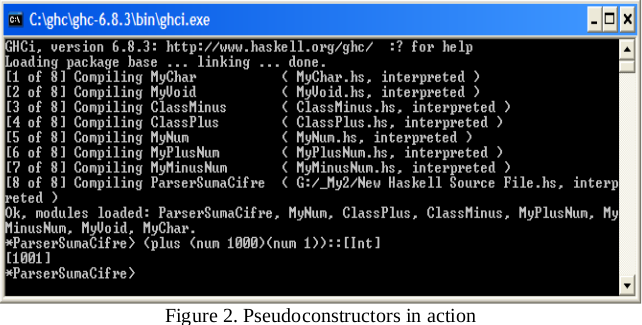Research area
. The Expression Problem
In 1998 P.Wadler had defined "The Expresion Problem" (accordingly to Wouter Swierstra - Data types a la carte ).
"The goal is to define a data type by case, where one can add new cases to the data type and new functions over the dat a type , without recompiling existing code, and while retaining static type safety."
Ten years later a simple and clear solution (2008) was given by Dan Popa User:Ha$kell in a speech scheduled for AngloHaskell/2008 http://www.haskell.org/haskellwiki/AngloHaskell/2008
You may download the presentation from http://www.haskell.org/wikiupload/1/1d/Prezentare-Anglo-Haskell-2008-draft2-more-slides.pdf
. The key ideea
Those monadic replacements for data constructors are simultaneously syntax and semantics and works with every monad !
The main ideea is extremely simple: a data constructor as those defined in a data declaration can be replaced with something like:
plus x y = do { valueofx <- x;
valueofy <- y;
return (f x y) }
where (f) = (+)See more examples here on the page of Modular Monadic Compilers for Programming Languages.
. Why this solution is so interesting
And why it is so simple and clear ?Let's see:
- it did not use a fixpoint operator !!
- it did not use a Maybe (high level embeded) type !!
- it did not propose a Haskell extension !!
- it did not use data declaration anymore !!
- as a consequence it did not use Data Constructors anymore !!
- it is introducing pseudoconstructors over monadic values because the chain of unevaluated (yet) functions is actually forming a datastructure . do not forget that Haskell is a lazy evaluation language !!
- because it is usable in a large sort of projects involving modular trees and modular monadic semantics (on every monad)
- because we used it succesfuly for modular:
- evaluators
- typecheckers : references will be added
- compilers :Modular Monadic Compilers for Programming Languages
. Why this solution is valuable .
- because we have already built modular languages like Rodin using it.
- because it works with just a bit overloading of the system : See final pages of http://www.haskell.org/wikiupload/1/1d/Prezentare-Anglo-Haskell-2008-draft2-more-slides.pdf
- because it is modular
- because language construction tools are valuable software (1000$ a Licence for a good language generator.)
- because it fits in the previous kind of systems with truee small modifications (just replace a single letter of a data constructor to transform it in a pseudoconstructor ...)
- the modular typecheckers can also be build using this tech.
- because my Ph.D Superviser is wishing to sell custom languages with a price of aprox 10 000$ / language - or at least he declared this some times ago.
References: see the .pdf of the latest papers from User:Ha$kell's homepage. Ill be back. Download and read the latest papers of Dan Popa from User:Ha$kell's homepage.
. Modular Monadic Interpretation
See the Rodin project. ... Find some basics and news in Practica interpretarii monadice. (Ro - book)
. Modular Monadic Type-Checking
Will be added...
. Modular Monadic Compilation
See Modular Monadic Compilers for Programming Languages, this page from 2011.
. References
Dan Popa, "Modular evaluation and interpreters using monads and type classes in Haskell" , Studii si Cercetari Ştiinţifice, Seria Matematica, Univ. Bacău, (18) 2008. An Open Office (.sxw) file including example code is available here: Download .sxw After loading the .sxw in the Open Office, press the PDF button from the toolbar to produce your own .pdf file. Or Official PDF of the paper for <DOWNLOAD> , having the following title:
Direct modular evaluation of expressions using the monads and type classes in Haskell by DAN V. POPA UNIVERSITATEA DIN BACĂU STUDII ŞI CERCETĂRI ŞTIINŢIFICE Seria: MATEMATICĂ Un draft al lucrarii Adaptable Software - Modular Extensible Monadic Entry-pointless Type Checker in Haskell by Dan Popa , Ro/Haskell Group, Univ. “V.Alecsandri”, Bacau este aici: download Nr. 18 (2008), pag. 233 – 248
The paper is introducing Pseudoconstructors over monadic values as a way of building modular trees without data or Haskell extensions. http://www.haskell.org/wikiupload/7/7d/POPA_D.pdf. Modular adaptable interpreters for extensible languages - like Rodin - become now easy to build, without the need of any Haskell extensions.
Adaptable Software - Modular Extensible Monadic Entry-pointless Type Checker in Haskell by Dan Popa , Ro/Haskell Group, Univ. “V.Alecsandri”, Bacau <DOWNLOAD> in .ps format
The paper was (on 27th of may 2011) presented to the NCMI 2011 Conference, in Bacau.
more ... will be added
. 'Dotted' list of references:
[1] http://www.haskell.org/haskellwiki/Pseudoconstructors_over_monadic_values They have a page here, but only paragraph #7 is in English now.
[2] Something in English http://www.haskell.org/haskellwiki/Research_area
[3] A paper , where the main simple ideea is at the base of page http://www.haskell.org/wikiupload/7/7d/POPA_D.pdf
[4] The draft of a presentation http://www.haskell.org/wikiupload/1/1d/Prezentare-Anglo-Haskell-2008-draft2-more-slides.pdf (maybe a good point to start)
...
